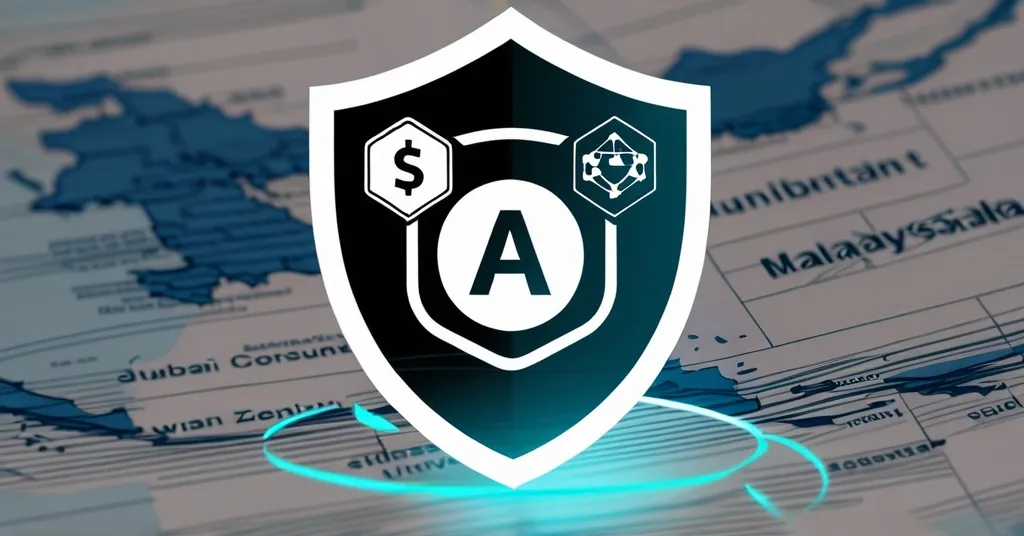Malaysia Fights Corruption with Blockchain and AI: A Global Trendsetter

Malaysia’s Battle Against Corruption: Harnessing Blockchain and AI
Malaysia is leveraging the power of blockchain and artificial intelligence (AI) to tackle corruption and fraud, aiming to become a pioneer in using technology for governance.
- Malaysia’s anti-corruption strategy utilizing blockchain and AI.
- The role of the MyDigital ID Superapp in digital transformation.
- International collaboration with the United Arab Emirates.
- Global trends in blockchain and AI for governance.
The Malaysian Anti-Corruption Commission (MACC), led by chief commissioner Tan Sri Azam, is at the forefront of this technological revolution. “Technological progress can actually be leveraged with the use of AI, including its use from the aspect of data analytics, as well as blockchain technology,” Azam stated, highlighting the dual approach to combat the slick tactics of modern criminals.
Blockchain, essentially a secure way to record transactions that cannot be altered, plays a crucial role in this strategy. Its immutable nature means records cannot be changed once entered, ensuring transparency and reducing opportunities for manipulation. As Azam explained, “Blockchain ensures immutable transaction records, while AI enhances data analytics, enabling the detection of fraud patterns and financial irregularities.”
AI, which can be thought of as computers that learn and detect patterns in data, complements blockchain by enhancing the ability to analyze vast amounts of information for signs of corruption. This technological synergy aims to provide a robust defense against financial malfeasance.
The MyDigital ID Superapp is a key component of Malaysia’s digital transformation efforts. Built on blockchain, this platform simplifies access to digital services while maintaining high standards of security and privacy. Fadzli Shah, head of MIMOS subsidiary MYEG, emphasized its significance: “This platform will simplify access to digital services while maintaining the highest standards of data security and user privacy. At the same time, it will enable businesses to unlock new opportunities and streamline their operations in the digital age.”
Internationally, Malaysia is collaborating with the United Arab Emirates to tap into their expertise in blockchain technology and digital asset regulations. This partnership underscores Malaysia’s commitment to staying at the cutting edge of technological innovation while learning from global leaders.
This initiative reflects broader global trends where countries are increasingly turning to blockchain and AI to improve governance. The adoption of these technologies aligns with the principles of decentralization and effective accelerationism, as they promote transparency and efficiency in public sectors. While not directly mentioned in Malaysia’s strategy, the use of these technologies dovetails with the potential applications of cryptocurrencies like Bitcoin in enhancing financial security and accountability.
However, the journey is not without its challenges. The need for extensive training and development of competencies among personnel, as mentioned by Prime Minister Anwar Ibrahim, is a significant hurdle. Additionally, the regulatory environment must evolve to address the risks associated with digital assets. Malaysia’s recent regulatory actions against unlicensed virtual asset service providers (VASPs) highlight the delicate balance between fostering innovation and ensuring investor protection.
While Malaysia’s efforts are commendable, it’s essential to maintain a critical eye on the potential for these technologies to be misused. Privacy concerns and the need for robust cybersecurity measures to protect blockchain systems from hacks are areas that require ongoing vigilance. Moreover, the ethical implications of using AI for surveillance must be carefully considered to ensure it does not infringe on individual rights.
Despite these challenges, Malaysia’s approach could serve as a blueprint for other nations looking to harness blockchain and AI to foster a more transparent and secure future. As we champion the potential of decentralized technologies, we must also remain realistic about the work required to realize their full benefits.
Key Takeaways and Questions
- What technologies is Malaysia using to fight corruption and fraud?
Malaysia is using blockchain and AI to enhance its anti-corruption efforts.
- How does blockchain help in fighting corruption?
Blockchain provides immutable records and a transparent ledger, reducing manipulation and enhancing accountability.
- What is the role of AI in this initiative?
AI improves data analytics, enabling the detection of fraud patterns and financial irregularities.
- What is the MyDigital ID Superapp and its significance?
The MyDigital ID Superapp is a blockchain-based platform that enhances digital security and service integration in Malaysia.
- How is Malaysia collaborating with other countries in this field?
Malaysia collaborates with the UAE to leverage their expertise in blockchain technology and digital asset regulations.
- What broader trends does Malaysia’s initiative reflect?
Malaysia’s efforts align with global trends in using blockchain and AI to improve governance and efficiency in public sectors.
“Technological progress can actually be leveraged with the use of AI, including its use from the aspect of data analytics, as well as blockchain technology.” – Tan Sri Azam
“Blockchain ensures immutable transaction records, while AI enhances data analytics, enabling the detection of fraud patterns and financial irregularities.” – Tan Sri Azam
“This platform will simplify access to digital services while maintaining the highest standards of data security and user privacy. At the same time, it will enable businesses to unlock new opportunities and streamline their operations in the digital age.” – Fadzli Shah



